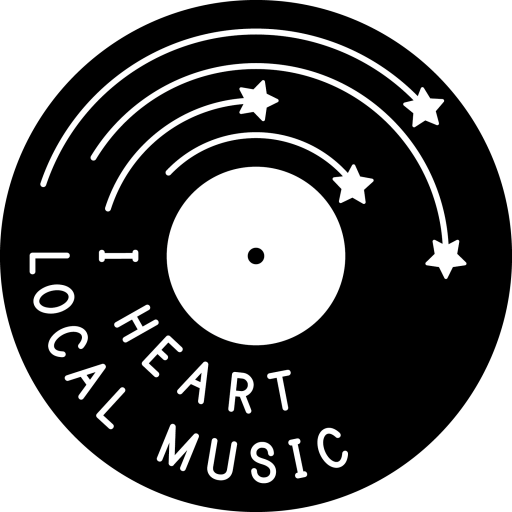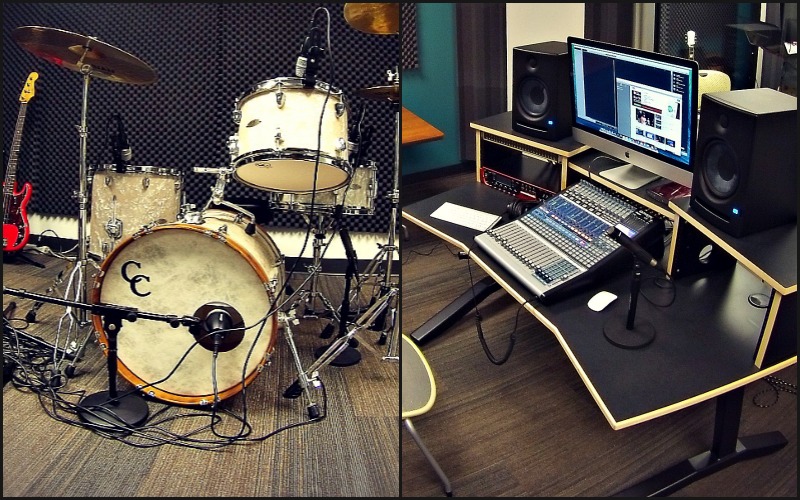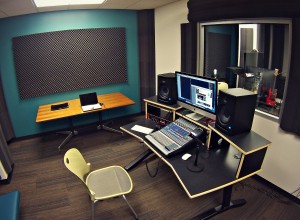 Last month when we told you about a recording studio the Lawrence Public Library installed free for the public to use, the response was overwhelming. It’s no surprise. The Sound + Vision Studio is a godsend for local musicians. They have access to the studio for free. Completely free. You don’t even need a library card to use it!
Last month when we told you about a recording studio the Lawrence Public Library installed free for the public to use, the response was overwhelming. It’s no surprise. The Sound + Vision Studio is a godsend for local musicians. They have access to the studio for free. Completely free. You don’t even need a library card to use it!
Naturally, musicians who have been aching to record an album are curious. But since the library only allows two three-hour sessions per month, you have to plan your time wisely. So we’ve constructed a how-to guide for first-timers heading into the studio, compiled by a versatile group of local musicians here in Lawrence. Here are some responses to basic questions from Cameron Hawk (Stiff Middle Fingers / Many Moods of Dad / Dead Girls), CS Luxem, Approach, and Steve Squire (recording engineer / Major Games):
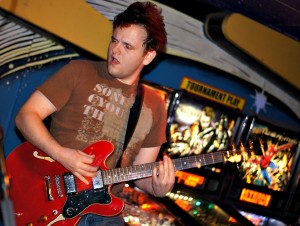
1. What are some basic guidelines for those heading into the studio for the first time?
Cameron Hawk: The first thing to do is to figure out what type of recording you want to make. If you only have 3 to 6 hours, everyone needs to sit down and decide: Are we going to work really hard on getting a couple songs as perfect as we can, or are we going to just go nuts and bust out as many songs as possible in that time? Time is immensely valuable in the studio, and everything goes much smoother if you’re all on the same page. Communicate as much as possible to avoid dumb arguments, and even if you’re the type that just likes to “jam”, try to have a really good idea of everything you want to do before going in. It’s just going to save time in the end, and it will benefit the group as a whole. This applies to solo artists as well, and it’s actually even harder for only one person. You have less people to bounce ideas off of and it can be easier to get stuck. Again, just spend some ample time before going into the studio really mapping out what you want to do. Actually sitting down and making an outline of all your ideas and what order to execute them in is really helpful.
Steve Squire: Be prepared musically before stepping into any recording situation – even if you arent paying a studio/engineer. Be well rehearsed, know the material like you know the sky is blue. This also includes instrument maintenance – If you play a stringed instrument – change your strings. If you play drums – change your drum heads and buy some new sticks. If you plan on using your own amplifiers – make sure they are working properly. If you are an up and coming vocalist, maybe lay off the booze and smoking a few days before and drink plenty of water. Equipment and Performance malfunctions steal away precious creative time in the studio – so take care of those things beforehand.
Approach: Come to the studio prepared. Practice your music beforehand and know it by heart. This way when you enter your session you can focus on the performance. There is nothing worse than wasting your money and time because you’re unprepared. Recording engineers hate waiting around while you get your stuff together.
CS Luxem: Rehearse and have clear ideas for song structure. Also figuring out the bare minimum of what you want to accomplish during those first few hours, then fine tune things after you have the skeleton in place.
2. What would you tell a band vs. an individual artist when they’re getting ready to record?
Cameron Hawk: Working solo is a lot harder. If you’re actually paying to use a studio, you need to come in super prepared or it’s just going to be a waste of time and especially your money. If you’re just working from a setup at home, that’s a different story. That’s actually what I would recommend for solo artists – it’s way more fun and relaxing to do stuff at your own pace. For bands, just communicate everything. Over-communicate. Be open about what you want and don’t expect anyone to read your mind.
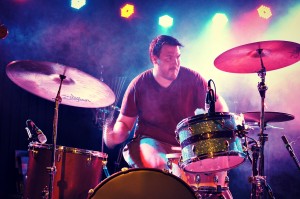
Approach: Bands, know your parts and have your music down. I can’t stress this enough. Solo artists, you will need to manage your time wisely. There will be a lot more on your plate, so you will need to be focused, efficient and organized.
CS Luxem: Communication is key, with yourself or with a group of people. Know what you want to do and do you best to see it through. Have a vision.
3. What’s the most important thing a musician can do in the studio?
Cameron Hawk: I just recorded a solo album at a studio in Kansas City on which I performed all the vocals and music tracks myself. It was basically done in one marathon 15-hr session with one other 5-hr session for extra overdubs. It was extremely challenging, but I was able to get a lot done because I knew exactly not only what I wanted to do, but what I would be able to do in that time. To me, the most important way of succeeding in the studio is weighing your expectations correctly – asses the situation and be realistic about what you can accomplish.
Steve Squire: If you are on your own without an engineer – let the person in your group most comfortable with the computer recording software ‘pet’ the mouse during the session. Additionally, whomever is the best at working the Mixer or placing Microphones, let them do that job. Decide those roles before you walk thru the door to avoid confusion and headaches.
Use only the equipment you are comfortable with. Attempting to use something new and shiny and unfamiliar can backfire quickly, so stick with what you know works. If no one has any experience with recording hardware/software, consider teaching yourself a few basics – utilize youtube tutorials or better yet, ask the studio if you can quietly attend a session to see how things work.

Approach: Capture the feeling and emotion the song needs to be complete. The special feeling you felt when you wrote it is what you’re searching for when you record it. If/when you find it during the session you’ll know you’re on course to completion.
CS Luxem: Trust yourself and your instincts. Know thyself.
4. What is detrimental to a studio session?
Cameron Hawk: I think there are three big things that can destroy a session. 1) Being unprepared. 2) Not being open to ideas. 3) Not communicating your ideas effectively.
Don’t spend a bunch of money just to go into a studio to “see what happens”. Chances are you are not Tom Waits or Elliott Smith, and you won’t just be able to go “knock out an album real quick”. Maybe if you’ve been doing this for awhile, that would be possible – but if you’ve been doing this for awhile, you probably wouldn’t be reading this right now.
ALWAYS leave room in your mind to stay open to ideas. Don’t get married to an idea before you’ve even tried it or confirmed it is possible in the studio. You’ll probably end up disappointed. Remember that the studio may seem like a magical place, but it isn’t, really – it is wrought with limitations and has its own code and language, just like any other working entity. Work within your limitations and learn how to use them to your advantage.
Finally, don’t be afraid to really put your ideas out there. Don’t assume that someone else is going to “catch” something in a recording that you don’t like, because you might end up just having to live with it forever. Everyone hears things differently, and something that sounds bad to you might not stick out at all to anyone else. Make your thoughts known to the group. On the other hand, listen to their ideas, as well. Maybe something you don’t like is actually something you just aren’t used to, but is actually really cool. Listen to the ideas of others and gauge the overall reaction. NEVER assume that your idea is the best idea just because it is yours.
Steve Squire: Be respectful of the Studio – If you have 3 hours allotted, make sure the last 20-30 minutes is spent putting everything back where you found it. Keep in mind that other people will be using the space after you and nothing is worse than spending the majority of your setup time cleaning up someone else’s mess. Wrap cables, return stands and microphones to where they belong. Try not to wrap those mic cables like your grandpa wraps up his extension cords in the garage, be gentle.
If a piece of gear breaks or malfunctions during your session, notify a member of the studio staff so that they can gather the piece and remove it from service until its repaired or replaced. Nothing is more time consuming than chasing down broken/intermittent gear during a session. If you do break something – offer to pay for its repair. Usually the staff will be very understanding and tell you its ok. Be NICE.

CS Luxem: Constant second guessing decisions and choices you make. If you make/start something do your absolute best to finish it. If it’s not what you want when you’re done, do it again.
5. What should someone do to get themselves prepped and focus for the event?
Cameron Hawk: Again, it really helps to sit down and make an outline of everything you want to accomplish during the session. For example, list out all the different vocal parts/instrument tracks/etc. that need to be recorded. Try to decide the best and most efficient order in which to do everything. Keep it like a checklist and cross off everything as it gets done. Some bands like to put up big dry erase boards in the studio and keep track of it that way, so everyone can follow along.
Also, think about the kind of album you really want to make and the best way to make that type of recording. If you are a punk rock band and your energy relies on spontaneousness and live sounds, don’t painstakingly overdub every little track. Get in there and bust it out, like a punk band would. If you want to make a multilayered singer-songwriter, Pet Sounds sort of masterwork, don’t go in there and do everything first-take. Push yourself to get the best possible performances.
But really, the best way is just to do whatever you want and learn from your experience, and apply those lessons to future experiences.
Approach: I find that practice makes me comfortable. The more comfortable I am with the material, the better the performance will be. If I know the material, I won’t have to stress over it and i can focus on reading the crowd.
CS Luxem: Whatever you do to normally focus, there really isn’t one tried and true method.
Important note from Steve Squire:
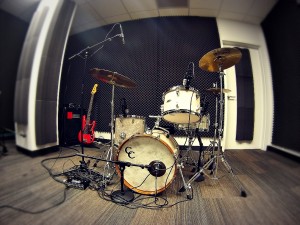 Don’t forget to credit the Studio or anyone that helped you realize your fantastic audio dreams. The studio would appreciate the credit and consider dropping off the completed package as a gift. If your super cool friend that’s good at Pro Tools totally helped you with the production, and is trying to make it as an engineer, consider telling others and help him/her get new work. If you give interviews or have your album reviewed – make sure the writer knows where and who helped record the record, especially in this new ‘digital’ era of self-published music blogs/press- the engineer/studio/producer is more often than not completely overlooked. So make sure to give your pal or the studio a proper shout out. If he/she helped you with the arrangements or writing – credit him/her as a producer and let everyone know how helpful they were in interviews with the press. Sure, you wrote the songs, but they translated that into a listenable recording experience – and it probably wasn’t easy. Don’t forget those Liner Notes too!
Don’t forget to credit the Studio or anyone that helped you realize your fantastic audio dreams. The studio would appreciate the credit and consider dropping off the completed package as a gift. If your super cool friend that’s good at Pro Tools totally helped you with the production, and is trying to make it as an engineer, consider telling others and help him/her get new work. If you give interviews or have your album reviewed – make sure the writer knows where and who helped record the record, especially in this new ‘digital’ era of self-published music blogs/press- the engineer/studio/producer is more often than not completely overlooked. So make sure to give your pal or the studio a proper shout out. If he/she helped you with the arrangements or writing – credit him/her as a producer and let everyone know how helpful they were in interviews with the press. Sure, you wrote the songs, but they translated that into a listenable recording experience – and it probably wasn’t easy. Don’t forget those Liner Notes too!
